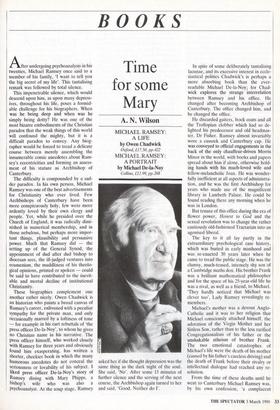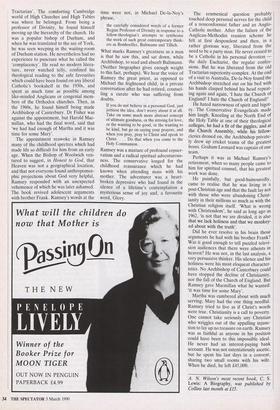BOOKS
Time for some Mary
A. N. Wilson
MICHAEL RAMSEY: A LIFE by Owen Chadwick
Oxford, £17.50, pp.422
MICHAEL RAMSEY: A PORTRAIT by Michael De-la-Noy
Collins, L12.99, pp.268
After undergoing psychoanalysis in his twenties, Michael Ramsey once said to a member of his family, 'I want to tell you the big secret of my life'. This tantalising remark was followed by total silence.
This impenetrable silence, which would descend upon him, as upon many depress- ives, throughout his life, poses a formid- able challenge for his biographers. When was he being deep and when was he simply being dotty? He was one of the most bizarre embodiments of the Christian paradox that the weak things of this world will confound the mighty, but it is a difficult paradox to convey. Any biog- rapher would be forced to tread a delicate course between merely assembling the innumerable comic anecdotes about Ram- sey's eccentricities and forming an assess- ment of his stature as Archbishop of Canterbury.
The difficulty is compounded by a sad- der paradox. In his own person, Michael Ramsey was one of the best advertisements for Christianity who ever lived. Few Archbishops of Canterbury have been more conspicuously holy, few were more ardently loved by their own clergy and people. Yet, while he presided over the Church of England, it was radically dimi- nished in numerical membership, and in those nebulous, but perhaps more impor- tant things, plausibility and persuasive power. Much that Ramsey did — the setting up of the General Synod, the appointment of dud after dud bishop to diocesan sees, the ill-judged ventures into ecumenism, the muddliness of his theolo- gical opinions, printed or spoken — could be said to have contributed to the inevit- able and mortal decline of institutional Christianity.
These biographies complement one another rather nicely. Owen Chadwick is an historian who paints a broad canvas of Ramsey's career, enlivened with a peculiar sympathy for the private man, and only occasionally marred by a loftiness of tone — for example in his curt rebuttals of 'the press officer De-la-Noy', to whom he gives no Christian name in his narrative. The press officer himself, who worked closely with Ramsey for three years and obviously found him exasperating, has written a shorter, cheekier book in which the many humorous anecdotes do not conceal the seriousness or lovability of his subject. I liked press officer De-la-Noy's story of Ramsey dining with Mary Phipps, a bishop's wife who was also a Psychoanalyst. At the soup stage, Ramsey asked her if she thought depression was the same thing as the dark night of the soul. She said, 'No'. After some 15 minutes of further silence and the serving of the next course, the Archbishop again turned to her and said, 'Good. Neither do I'. In spite of some deliberately tantalising lacunae, and its excessive interest in eccle- siastical politics Chadwick's is perhaps a more absorbing book than the ever- readable Michael De-la-Noy; for Chad- wick explores the strange interrelation between Ramsey and his office. He changed after becoming Archbishop of Canterbury. The office changed him, and he changed the office.
He discarded gaiters, frock coats and all the Trollopian clobber which had so de- lighted his predecessor and old headmas- ter, Dr Fisher. Ramsey almost invariably wore a cassock and Canterbury cap. He was conveyed to official engagements in the back of the only chauffeur-driven Morris Minor in the world, with books and papers spread about him if alone, otherwise hold- ing hands with his much-loved wife and fellow-melancholic Joan. He was wonder- fully inefficient at all aspects of administra- tion, and he was the first Archbishop for years who made use of the magnificent library in Lambeth Palace. He could be found reading there any morning when he was in London.
But tenure of this office during the era of flower power, Honest to God and the sexual revolution was to change the rather cautiously old-fashioned Tractarian into an agonised liberal.
The key to it all lay partly in the extraordinary psychological case history, which was buried in early manhood and was re-enacted 30 years later when he came to tread the public stage. He was the clumsy, much-teased, intensely shy son of a Cambridge maths don. His brother Frank was a brilliant mathematical philosopher and for the space of his 25-year-old life he was a rival, as well as a friend, to Michael. 'They hardly noticed that Michael was clever too', Lady Ramsey revealingly re- members.
Michael's mother was a devout Anglo- Catholic and it was to her religion that Michael consciously attached himself, the adoration of the Virgin Mother and her Sinless Son, rather than to the less rarified Congregationalism of his father or the unshakable atheism of brother Frank. The two emotional catastrophes of Michael's life were the death of his mother (caused by his father's careless driving) and the death of Frank before their rivalry or intellectual dialogue had reached any re- solution.
From the time of these deaths until he went to Canterbury Michael Ramsey was, by his own confession, 'a complacent Tractarian'. The comforting Cambridge world of High Churches and High Tables was where he belonged. From being a professor of Divinity, he found himself moving up the hierarchy of the church. He was a popular bishop of Durham, and when he was translated to the see of York, he was seen weeping in the waiting-room of Durham station. He nevertheless had no experience to puncture what he called the 'complacency'. He read no modern litera- ture, never watched telly, confined his theological reading to the safe favourites which could have been found on any liberal Catholic's bookshelf in the 1930s, and spent as much time as possible among like-minded Anglicans or congenial mem- bers of the Orthodox churches. Then, in the 1960s, he found himelf being made Archbishop of Canterbury. Dr Fisher was against the appointment, but Harold Mac- millan, who had the final word, said that 'we had had enough of Martha and it was time for some Mary'.
The appointment reawoke in Ramsey many of the childhood spectres which had made life so difficult for him from an early age. When the Bishop of Woolwich ven- tured to suggest, in Honest to God, that Heaven was not a geographical location, and that not everyone found anthropomor- phic projections about God very helpful, Ramsey responded with an unexpected vehemence of which he was later ashamed. The book revived adolescent arguments with brother Frank. Ramsey's words at the time were not, in Michael De-la-Noy's phrase,
the carefully considered words of a former Regius Professor of Divinity in response to a fellow-theologian's attempts to synthesise the work of such great contemporary think- ers as Bonhoeffer, Bultmann and Tillich.
What marks Ramsey's greatness as a man is that he saw this, and sat down, while Archbishop, to read and absorb Bultmann. (Neither biographer gives enough weight to this fact, perhaps). We hear the voice of Ramsey the great priest, as opposed to Michael the frightened child, in a private conversation after he had retired, counsel- ling a curate who was suffering from doubts.
If you do not believe in a personal God, just jettison the idea, don't worry about it at all. Take on some much more abstract concept of ultimate goodness, or the striving for love, or the wanting to be good, or the wanting to be kind, but go on saying your prayers, and when you pray, pray to Christ and speak to Christ. . . Do that when you come to the Holy Communion.
Ramsey was a mixture of profound conser- vatism and a radical spiritual adventurous- ness. The conservative longed for the childhood reassurance which he had known when attending mass with his mother. The adventurer was a heart- broken depressive who had found in the silence of a lifetime's contemplation a mysterious sense of joy and, a favourite word, Glory. The ecumenical question probably touched deep personal nerves for the child of a nonconformist father and an Anglo- Catholic mother. After the failure of the Anglican-Methodist reunion scheme he felt at first despondent and then, in a rather glorious way, liberated from the need to be a party man. He never ceased to be a Catholic in his personal devotion — the daily Eucharist, the regular confes- sions. But he was liberated from the old Tractarian superiority-complex. At the end of a visit to Australia, De-la-Noy found the Archbishop stretched out on his bed with his hands clasped behind his head repeat- ing again and again, 'I hate the Church of England! I hate the Church of England!'
He hated narrowness of spirit and bigot- ry. The Conservative Evangelicals made him laugh. Kneeling at the North End of the Holy Table at one of their theological colleges, he had a fit of the giggles, and at the Church Assembly, while his fellow- clerics droned on, the Archbishop private- ly drew up cricket teams of the greatest bores. Graham Leonard was captain of one team.
Perhaps it was in Michael Ramsey's retirement, when so many people came to him for spiritual counsel, that his greatest work was done.
He painfully, but good-humouredly, came to realise that he was living in a post-Christian age and that the fault lay not with those who were abandoning Christ- ianity in their millions so much as with the Christian religion itself. 'What is wrong with Christendom', he said as long ago as 1962, 'is not that we are divided, it is also that we lack holiness and that we monkey- ed about with the truth'.
Did he ever resolve in his brain those arguments he had with his brother Frank? Was it good enough to tell puzzled televi- sion audiences that there were atheists in heaven? He was not, in the last analysis, a very persuasive thinker. His silence and his holiness were his most eloquent character- istics. No Archbishop of Canterbury could have stopped the decline of Christianity, nor the fall of the Church of England. But Ramsey gave Macmillan what he wanted: 'it was time for some Mary'.
Martha was cumbered about with much serving; Mary had the one thing needful. Ramsey tried to live as if Christ's words were true. Christianity is a call to poverty. One cannot take seriously any Christian who wriggles out of the appalling injunc- tion to lay up no treasure on earth. Ramsey was as faithful as anyone in his position could have been to this impossible ideal. He never had an interest-paying bank account. He was not ostentatiously ascetic, but he spent his last days in a convent, sharing two small rooms with his wife. When he died, he left £45,000.
A. N. Wilson's most recent book, C. S. Lewis: A Biography, was published by Collins last month at £15.



























































 Previous page
Previous page